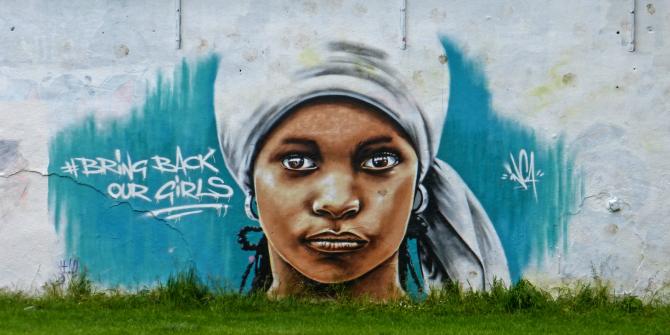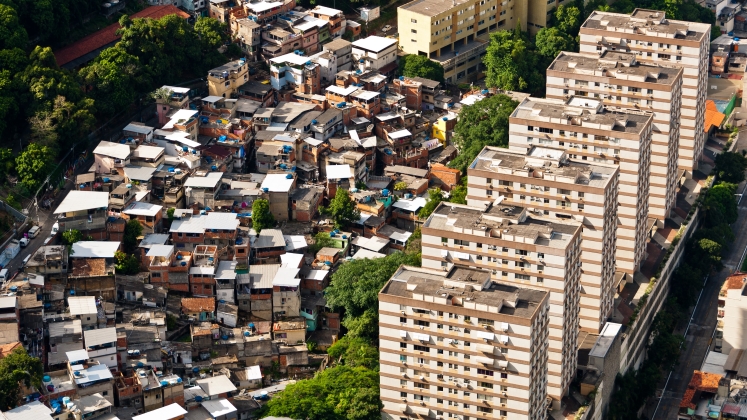In ‘Eat the Heart of the Infidel’: The Harrowing of Nigeria and the Rise of Boko Haram, journalist Andrew Walker examines the emergence of Boko Haram, teasing out the societal and state structures that contributed to its rise and sustained its position. With the book drawing on a comprehensive range of resources, Fisayo Ajala recommends this well-researched and dutifully analysed work.
‘Eat the Heart of the Infidel’: The Harrowing of Nigeria and the Rise of Boko Haram. Andrew Walker. Hurst. 2016.
The north east of Nigeria is a region where the state, specifically the security the state is supposed to provide in its most basic form, was already weak and ineffective. Boko Haram put those already weak institutions into an almost complete reverse. The limited writ of the state, the failure of democratic governance and the thin influence of the rule of the law in the north east had been laid bare for all to see. The heart of the state had already been eaten hollow (161).
The above paragraph from Andrew Walker’s ‘Eat the Heart of the Infidel’: The Harrowing of Nigeria and the Rise of Boko Haram explains the near-capitulation of the Nigerian state at the peak of the Boko Haram insurgency. The technical defeat of Boko Haram in December 2015 could therefore be regarded as a narrow escape.
Walker’s book is a major addition to existing literature on Boko Haram that has described and examined its emergence, the factors that have sustained it and the dynamics of Nigeria’s war against this insurgent group. The book is a reader’s delight. The journalistic background of the author gives life to the book and enthrals in many ways. It provides a dispassionate analysis of Nigeria’s history, particularly of the north, and the prevailing structural and societal imbalances that gave rise to Boko Haram.
Writing on the country since 2006 and having worked for the Daily Trust and the BBC, it is safe to conclude that Walker is well informed about Nigeria, its grand opportunities and fatal vulnerabilities as well as how it works. For instance, Walker decries its certificate culture and describes its education problem as a ‘rot’ that has eaten away the heart of society (73). According to Walker, Nigerian politics is a quilted blanket of clashing and complementary patterns (110), spread across the politics of patronage, stomach infrastructure, federal character, ethnic irredentism and so on.
 Image Credit: (Tim Green CC BY 2.0)
Image Credit: (Tim Green CC BY 2.0)
Walker’s book provides comprehensive detail on (northern) Nigeria’s socio-political and religious history, carefully noting the failed desire of Uthman dan Fodio, founder of the Sokoto Caliphate, to reorganise pre-colonial northern Nigeria or, more precisely, Hausa city states, along salafi principles and create a dynasty of ‘spiritual leaders and a purified faith’ (27), the varying interpretations of Islam among the different sects and the resistance to education that was accommodated because of colonial expediency (60). Decades later, Boko Haram under its founder, Mohammed Yusuf, would denounce western education in strong terms, describing the education system put in place during and after colonial rule as the ‘wellspring of corruption’ (145).
Walker outlines the nature, doctrine and methods of Boko Haram: how before the 2009 uprising Yusuf grew his community through da’wah – or proselytisation – so that his group operated like ‘a state within a state’, drawing followers from the urban and rural poor, trades people and the ‘informal sector’: street hawkers, cobblers, blacksmiths, knife sharpeners and tailors (146, 152). Because Yusuf, the now-slain leader of Boko Haram, was able to move through the many levels of the northern city Maiduguri’s social worlds, the group formed a ‘counter-elite alienated by resentment over what they saw as years of compromise to the state (147, 151).
Walker equally explains the recruitment process, noting the different kinds of people in Boko Haram (167), which fall into Tore Bjorgo’s three categories of captive participants, mercenaries and real ideologues. Recruitment exercises include cult-like, mysterious activities tied to dates tainted with cursed blood. Al Jazeera journalist Chika Oduah testifies to this as she notes that oath of allegiances – mubaya’a – and poisoned dabino (dates), tea and coconuts were asked of, and given to, would-be members as methods of indoctrination and recruitment. Yet, as Walker notes, the real ideologues are so indoctrinated that their world may be beyond reach: ‘they believe that the world is sort of a motor park. They are the passengers; they are the ones who are going somewhere, to paradise. The rest of us are just hawking peanuts’ (168).
In a sense, Boko Haram was a political creation, considering the ill-fated role that Ali Modu Sherif, former governor of Borno state, played in its emergence. Walker describes the relationship between Sherif and Yusuf, who both believed that they might benefit from their association. What Yusuf wanted from Sherif was guarantees of a stronger sharia and commitment to a hard line on God’s divine law; what Sherif wanted was to win election (153). The economy of affection between Sherif and Yusuf, cemented by the electoral success of Sherif in the 2003 Borno Governorship elections, quickly and noisily broke down irretrievably (see Gbemisola Animasawun and Luzman Saka and Goran Hyden). The blowback that followed became the harbinger of woes that spread beyond the shores of Nigeria, with Boko Haram overtaking ISIS as the world’s most deadly terrorist group in 2014.
Directly connected to this was the role of the security forces in the war against Boko Haram. Walker notes that in the early days of the insurgency, even before the state of emergency, Boko Haram were considered dangerous; yet, to the ordinary people of Maiduguri, ‘the police were the immediate, daily, and deadly threat’. The police’s appalling relationship with the people meant that at a stage when Boko Haram was still relatively weak operationally, citizens would not willingly come to the police with information as they justifiably feared that they would be arrested, detained and tortured by the state (177). A report by Amnesty International on the Nigerian military documents the crimes and atrocities committed by them in the fight against Boko Haram; likewise, its report on Boko Haram equally outlines those committed by the group.
While the actions of the military and the police cannot be divorced from their routine responses to (un)armed insurrections and authority-challenging acts against the state, Walker observes that overkill was not the only problem (182). Years of promoting officers on the basis of their loyalty not to the trade of soldiering, but rather to a reward scheme and parallel economy of patronage, took its toll (184). Endemic corruption seriously impeded counter-terrorism efforts and led to severe military failures. Another factor was the complacency and lack of political will of the Goodluck Jonathan government, whose analysis of the situation favoured avoiding problems and passing off responsibility (185).
Walker also notes how myriad crises of governance and the failure of state responsibility was, in part, a latent cause of Boko Haram. Boko Haram – like other terror groups – took advantage of this in the pursuit of their agenda of terror and, as a recent Mercy Corps publication reveals, to gain a foothold in communities: ‘The community perception about [Boko Haram] was that […] they are a new sect that is coming in peace because at the beginning they showed love and concern, and provided things to needy people of the community.’ Walker summarises the above when he notes that:
When Abubakar Shekau, the leader of Boko Haram, said they were coming to ‘eat the heart’ of the infidel state, what was it he thought he would find? The ability of the state in Nigeria to provide its basic functions, to provide forum for pluralistic politics, to guarantee its people security, to provide citizens with the educational tools needed for modern employment, have already been eaten by the people charged with providing them (129).
In many respects, Walker’s book presents an objective analysis of the Boko Haram crisis with no major issues left unattended, including the controversial and failed negotiations of Stephen Davis in the rescue of the Chibok Girls (212-13), the contradictory identities of Boko Haram as construed by conspiracy theorists (205) and Boko Haram’s ambiguous relationship with ISIS (218).
While events regarding Nigeria and Boko Haram have taken different twists and turns since the book was published – Boko Haram has been put under a reverse drive, it has undergone a leadership change in the midst of a perceived rapid decline and improved Counter Insurgency Operations (COIN) and negotiations have resulted in the release of 21 Chibok girls even as there has been a sustained spate of attacks, bombings and ambushes – Walker’s book, drawing on first-hand testimony, conversational narratives and extant secondary sources, is undoubtedly a reliable scholarly reference material that is dutifully analysed and beautifully written.
Fisayo Ajala obtained his first degree in History & International Studies from Ekiti State University (EKSU) and followed this up with a Master’s degree in Peace & Development Studies from the Centre for Peace and Strategic Studies, University of Ilorin, Nigeria. His current research is on democratisation, terrorism, counter-terrorism, radicalisation and deradicalisation. Read more by Fisayo Ajala.
Note: This review gives the views of the author, and not the position of the LSE Review of Books blog, or of the London School of Economics.








1 Comments